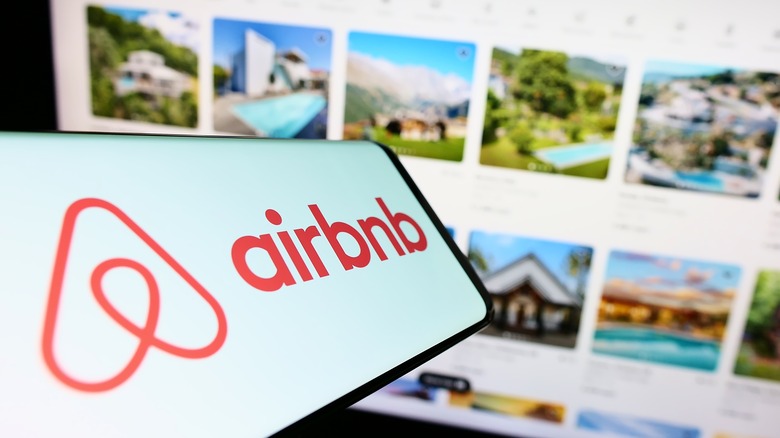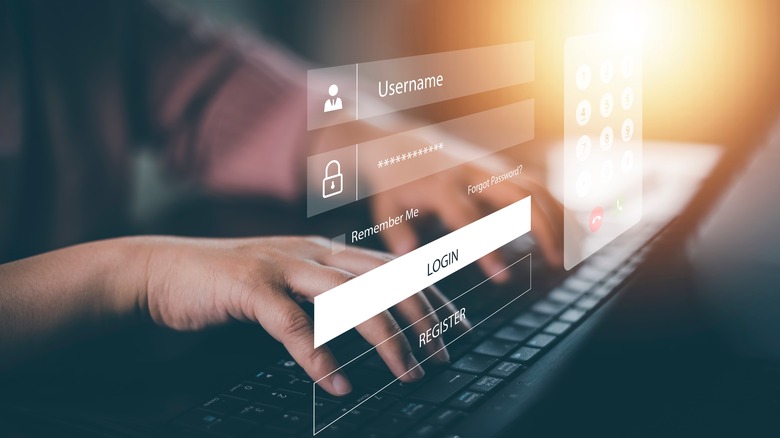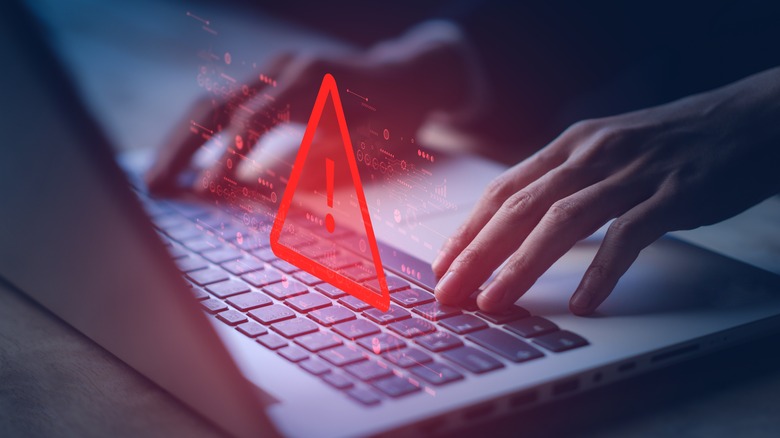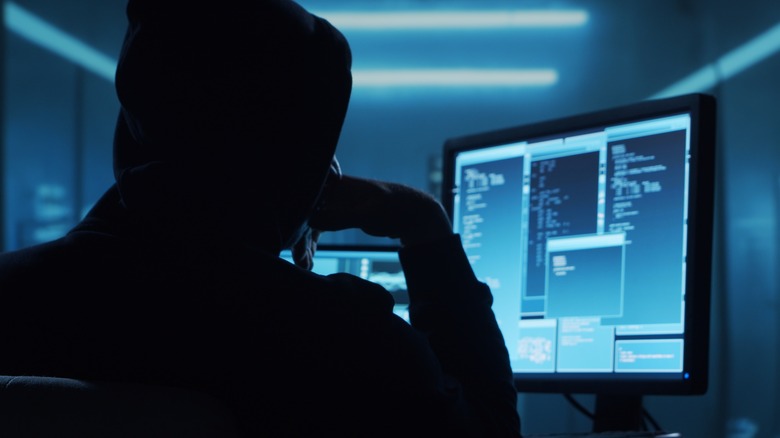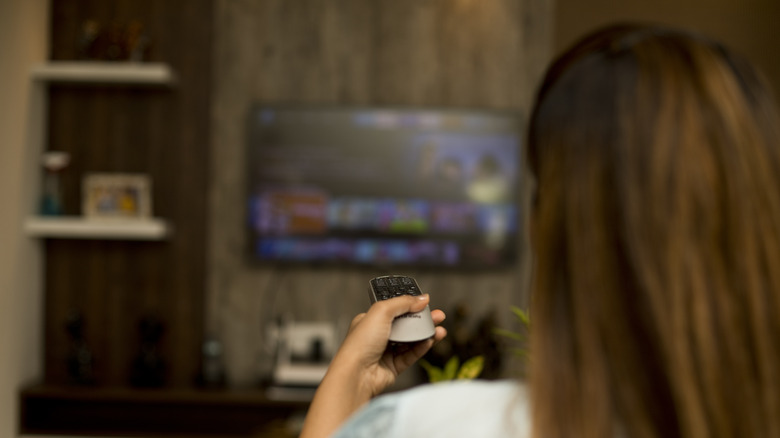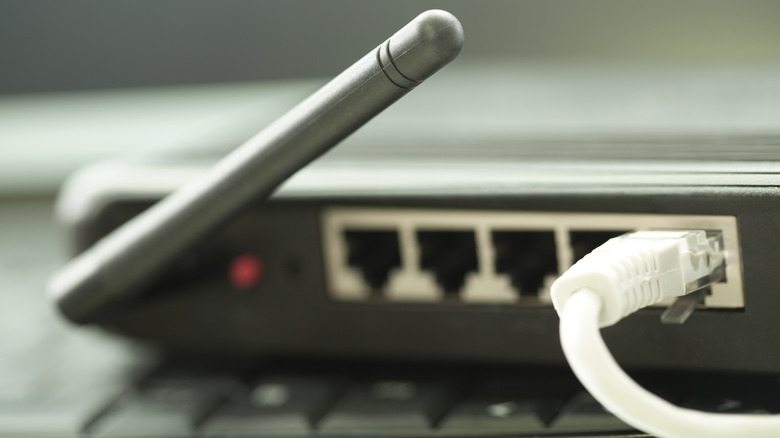Hidden Risks You Need To Know About Before Connecting To Your Air BnB's WiFi
Accessing the internet is no safe endeavor. There are sites all across the web created by bad actors for the sole purpose of harming you. But what you might not know is that simply accessing a Wi-Fi connection that is not your own can pose the same risks as clicking on a sketchy link. It's a common misconception that only public Wi-Fi networks located in heavily populated areas like train stations are unsafe because they do not require a password to connect. Well, even Wi-Fi networks with security protocols in place can pose a danger to you.
If you have not configured a wireless setup yourself, you have no way of telling how safe it is. Sometimes, the convenience of connecting to a temporary accommodation's WiFi network is not worth the risk. There are also other ways to fall victim to a malicious trap outside of using your own devices on the network. You can mitigate the risks outlined here via proper security measures in place, but there's a real chance you are not adequately protected.
Your data can be harvested
Your devices transfer data through a router and modem before making contact with the internet. However, that data can be intercepted through techniques such as an attack on encryption, IP spoofing, and SSL hijacking. Aptly called Man-in-the-Middle attacks, this hacking technique captures information transferred between communication devices. The attacks can take place before or after the connection reaches the router. Data shared with a hacker from one of these attacks can be anything from social media login information to bank records.
An Airbnb owner could set up their network for the purpose of stealing your data. What makes these attacks so scary is there is no indication that your information is being stolen.
It's no secret why someone might want to get access to your sensitive data. Hackers can use it to impersonate you online to make purchases or even sell your information to other hackers. So, stay cautious when choosing a host by carefully scouring reviews from former guests to avoid this happening.
You can get malware
Your device can become infected with malware from accessing an Airbnb Wi-Fi connection. A bad actor can manipulate a router's firmware to stream malware directly onto your device. There is also DNS spoofing, which can redirect those on the network to malicious sites. Sometimes, you won't even know these sites are trouble, as they can mimic popular pages to get you to download malware without knowing it.
Malware can affect you long after you leave an Airbnb. It can do everything from stealing your data to bricking your device. This can impact you even if you think you are protected against it. Although an anti-virus may block some malware, it is not foolproof. If the piece of malware is particularly advanced, the software won't identify it. They can also sometimes disable security measures such as Windows Firewall to allow malicious code to run on your device.
Past tenants can harm you
Even if you have read hundreds or even thousands of reviews from Airbnb users who have nothing but good things to say about the host, that doesn't mean their Wi-Fi is safe. That is because sometimes the host isn't the only one that can access the router. Wi-Fi routers are sometimes easy to get into, often not taking more than a paperclip to reset. Then, a bad actor can access all of the router's settings via a web browser after inputting generic login information.
Sometimes, they don't even need to reset the router. You'd be surprised how many people do not change a device's default username and password, which is often 'admin.' Some owners overlook this because they think having a password for connecting to the Wi-Fi will be enough. Once a hacker logs into a router, they can set up malicious traps for those that use it. So, there's a chance that whoever stayed at the location before you could have done just that.
There are also evil twin attacks where people create fake Wi-Fi entry points that seem legitimate but can direct users to malicious sites. This could be done by someone nearby, maybe even next door to the location where you are staying.
You are at risk using an owner's devices
You may think you are safe if you don't connect your devices to a host's Wi-Fi. The fact is that practically any smart device can be infected with a key logger to store your login information. This can be set up by the owner of the residence or by past guests.
You may think that if a hacker gets a hold of your Netflix password, it's no big deal. Well, it can be a serious problem if you use one password for everything. If your bank uses the same password, they can access your banking, for example. If you reuse usernames and passwords, you can check the website haveibeenpwned to see if your information has already been compromised.
Besides not logging into foreign devices, an obvious way to reduce the chances of this happening to you is to employ a unique, strong password for each of your services. If you are worried about losing your passwords, you can use a password manager to track them.
Aside from stealing your information, devices can spread malware if plugged into your device. This can be done through USB connections and even charging cables. So, be careful when using a cable laid out at an Airbnb.
How to protect yourself
One of the ways to enjoy Airbnb Wi-Fi while remaining safe is to deploy a Virtual Private Network (VPN). A VPN is an important security tool in many people's toolbelts because it creates an encrypted tunnel that gives it an extra layer of security against hackers, either on the same network or a hijacked router. Because the data is encrypted, it makes it harder for hackers to intercept your data via Man-in-the-Middle attacks.
Additionally, employing a VPN comes with other security benefits, such as hiding your real IP address to keep you from falling victim to Wi-Fi attacks that rely on having your IP address. It can also hide your network activity from the internet service provider and protect you from DDoS attacks.
In principle, you should employ a VPN any time you connect to a public network. If you don't want to pay for a VPN service, you can create your own server to secure your connection. However, this requires you to either create a virtual cloud private server, a dedicated physical machine, or a home router.
You can also just employ standard safe practices such as not logging onto other people's devices and not inputting sensitive information on a network that is not your own.
